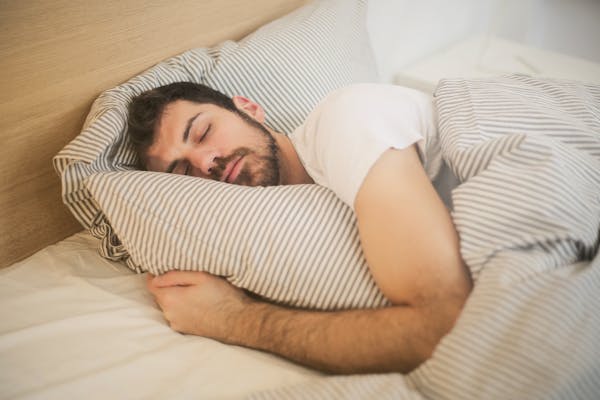We all know that a good night’s sleep is important. But what if we told you that skimping on that sleep could have consequences beyond feeling groggy? It’s true. Missing out on sleep can damage your brain, body, and overall well-being in ways you might not expect.
Sleep deprivation can be as detrimental to your cognitive function as being legally drunk. From increased accident risks to accelerated aging, the effects of sleep deprivation are shocking and far-reaching.
In this blog post, we’ll discuss five surprising consequences of sleep deprivation that will make you rethink those late nights.
1: Brain Fog and Poor Decisions
You must’ve felt like you were wading through mental quicksand after a sleepless night. Lack of sleep significantly impacts your brain, causing brain fog that hinders concentration, memory, and decision-making abilities.
Studies show that sleep deprivation causes irregular brain activity due to changes in different brain areas responsible for sleep and wakefulness. This leads to problems with focus, memory, alertness, decision-making, and other cognitive functions. You might struggle to stay focused on tasks, be easily distracted, and be unable to think clearly.
This mental sluggishness can have real-world consequences. If you’re working on a project, studying for an exam, or having a conversation when your brain feels like a haze. The Sleep Foundation confirms this, showing a 40% decrease in learning and retaining new information after sleep loss. Lack of sleep can significantly impact our productivity and increase the likelihood of errors.
2: Danger on the Road and at Work
Sleep deprivation can turn everyday tasks into dangerous endeavors. Fatigue can be devastating when driving or operating machinery.
According to the AAA Foundation for Traffic Safety, drowsy driving accounts for 17.6% of all fatal crashes within 2017-2021. If you’ve ever nodded off for a split second while driving, you know how terrifying it can be. Less sleep can increase your risk of a car accident by a staggering level.
The National Sleep Foundation survey found that 16% of teenagers and 60% of adults say they have driven drowsy once in their lifetime. Despite drowsy driving being a significant contributor to traffic deaths, only New Jersey and Arkansas have specific laws addressing this issue. These legislative changes could lower traffic fatalities and motivate drivers, especially in Arkansas.
The danger becomes more palpable when we bring it closer to home in Little Rock. This Arkansas city has highways that are not immune to the consequences of sleep deprivation behind the wheel. It has recently been granted a sum of $25 million to invest in road safety.
Imagine your or your loved one driving through the early morning traffic on Highway 12. A momentary lapse in focus could suddenly make your world spin. The screech of tires, the impact of metal, and the shattering of glass can become a nightmare that could have been avoided.
This is an example of the potential outcomes drivers face in Little Rock every day. The risk is accurate, and the consequences can be life-altering. When such accidents occur, the physical and emotional toll can be immense. Fortunately, getting compensation for your suffering is doable, states Keith Law Group.
In such trying times, seeking assistance, for example, from a Little Rock personal injury lawyer, can be a crucial step. It will help you get the compensation and justice that victims deserve. These legal professionals understand the complexities of personal injury law and can help navigate the legal process. They ensure that victims’ rights are protected and that they receive the maximum compensation possible.
These statistics are a sobering reminder that sleep is a necessity. Prioritizing rest can prevent serious harm to yourself and others.
3: Aging You Before Your Time
We all want to age gracefully, but did you know your sleep habits could speed up the clock? A lack of quality shut-eye can damage your appearance, making you look older than you are. According to the Medical University of South Carolina, healthy aging requires 7 to 8 hours of sleep. However, as we age, our sleep hours decrease. Around 10% to 40% of older people report insomnia.
There is a clear link between poor sleep and accelerated skin aging. Sleep is when your body repairs itself, including your skin. Without enough rest, your skin struggles to produce collagen, a protein that keeps it firm and plump.
But the effects go even more profound than skin-deep. Chronic sleep deprivation can speed up telomere shortening and accelerate epigenetic aging. Telomeres are like protective caps on your chromosomes. Their length is associated with biological age. Shorter telomeres are linked to a higher risk of age-related diseases and a shorter lifespan.
So, while you might be tempted to burn the midnight oil, remember that your body needs rest to stay young and healthy.
4: Your Brain on Low Power Mode
Lack of sleep impairs communication between different brain regions. This breakdown in communication affects memory consolidation, which is why you might struggle to remember things after a poor night’s sleep. It also involves emotional control, making you more prone to irritability, anxiety, and even impulsive behavior.
But the consequences don’t stop. Disturbingly, studies have linked sleep deprivation to the buildup of beta-amyloid in the brain. This protein is a biomarker of Alzheimer’s disease, raising concerns about the long-term impact of chronic sleep loss on cognitive health.
5: Mood Swings and Emotional Turmoil
Sleep deprivation has a profound impact on your emotional well-being. It makes you more susceptible to mood swings and even severe mental health issues.
Research has shown a strong link between lack of sleep and its impact on mental health. When you’re constantly running on empty, your brain struggles to regulate emotions, leaving you overwhelmed and vulnerable. You might find yourself snapping at loved ones, feeling down for no apparent reason, or experiencing unease.
It’s not just about feeling a little grumpy. People who are sleep-deprived are more likely to report feelings of sadness, hopelessness, and anger. These negative emotions can snowball, affecting your relationships, work performance, and overall quality of life.
FAQs
How long is it unsafe to not sleep?
Going without sleep for more than 24 hours is generally considered unsafe. After this point, your cognitive function, reaction time, and overall health deteriorate significantly. Additionally, your motor skills and reaction times become significantly compromised, making activities like driving or operating machinery extremely dangerous.
Can I go 15 days without sleep?
No, you cannot go 15 days without sleep. While short periods of sleep deprivation might be manageable, prolonged lack of sleep for that duration would have devastating consequences. Your body relies on sleep to repair and restore itself; without it, you’ll experience a significant decline in your overall health.
How do you recover from missing a night of sleep?
To recover from missing a night of sleep, prioritize catching up on sleep as soon as possible. Take a nap during the day or go to bed earlier that night. Avoid caffeine and alcohol, and create a relaxing bedtime routine to improve sleep quality.
Sleep is essential for maintaining physical and mental health, ensuring safety, and allowing one to live one’s best life. Prioritizing sleep means prioritizing yourself. Create a regular sleep routine, develop a calming bedtime ritual, and improve your sleeping surroundings. Small changes can make a big difference.
If you’re struggling with chronic sleep issues, seek help. A good night’s sleep is within your reach, and the positive impact on your overall well-being will be immeasurable.






